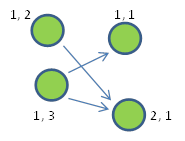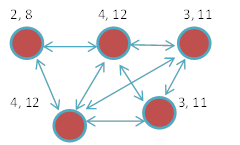Farms and First Pages
http://online.wsj.com/article/SB10001424052702303505504577406751747002494.html
It’s a familiar scene. I accidentally type in “.com” instead of “.org” and now I’m on a sketchy-looking website. It’s just links after links: “Sam’s Club,” “Chrome,” and “Nitromethane.” Why does this website even exist? I glance back up at the URL. It looks like I spelled everything correctly. Oh wait, no I didn’t. It should be “.org”. Websites like these show up in Google search results as well. Come on, Google. This obviously isn’t a legitimate website. Websites like these are aptly called link farms, defined by Wikipedia as a collection of websites that all link to one another. At a network level, these websites initially appear to be powerful nodes. Indeed, the method of hubs and authorities would result in inaccurately high hub and authority scores for all of these websites. Let the green nodes below be legitimate websites, and let the red nodes below be a link farm. The numbers next to each node show each node’s authority and hub score after just one round.
The relatively large scores in the link farm will just propagate further, becoming larger and larger. Their sole purpose is to fool Google, get undeserved web traffic, and make undeserved money. If they had their way, they’d take over the first couple of pages of Google’s search results. And this is just one example of what is called spamdexing. (Don’t worry, that doesn’t link to any spam.) But Google isn’t that passive. Google aggressively updates their search algorithms, 500 changes annually, according to this article, so that the cheaters—the link farms—don’t win. Their latest update, called Penguin, affects 3.7% of Google’s search results, and works to drastically lower the rankings of link farms, hopefully eliminating them from the first page of search results.
A quick metaphor: Google is like Vegas: the first page is the Strip, and the rest of the search results are the desert. So many small businesses rely on the first page of Google search results to thrive. There’s a delicate balance. Google needs to bar link farmers and other spammers from the first-page oasis, but has to be careful not to kick honest business owners out into the sand. This article gives one notable example, a company called Oh My Dog Supplies LLC. The company’s owner, Andrew Strauss, makes his money because his company often shows up on the front page of search results for queries like “dog clothes.” After Penguin was implemented, his monthly sales fell from $68,000 to $25,000. Why was he so harshly impacted by the updated algorithms? He previously paid for inbound links to increase web traffic after a previous algorithm change crippled his website. And Google bit back viciously. Too viciously, if you ask me. However, Google has no choice but to go on altering their algorithms. Otherwise, we’ll never find the links we’re looking for, unless, of course, you’re searching for the nearest Sam’s Club, trying to download Google Chrome, and buying some Nitromethane—at the same time.
-ras578


